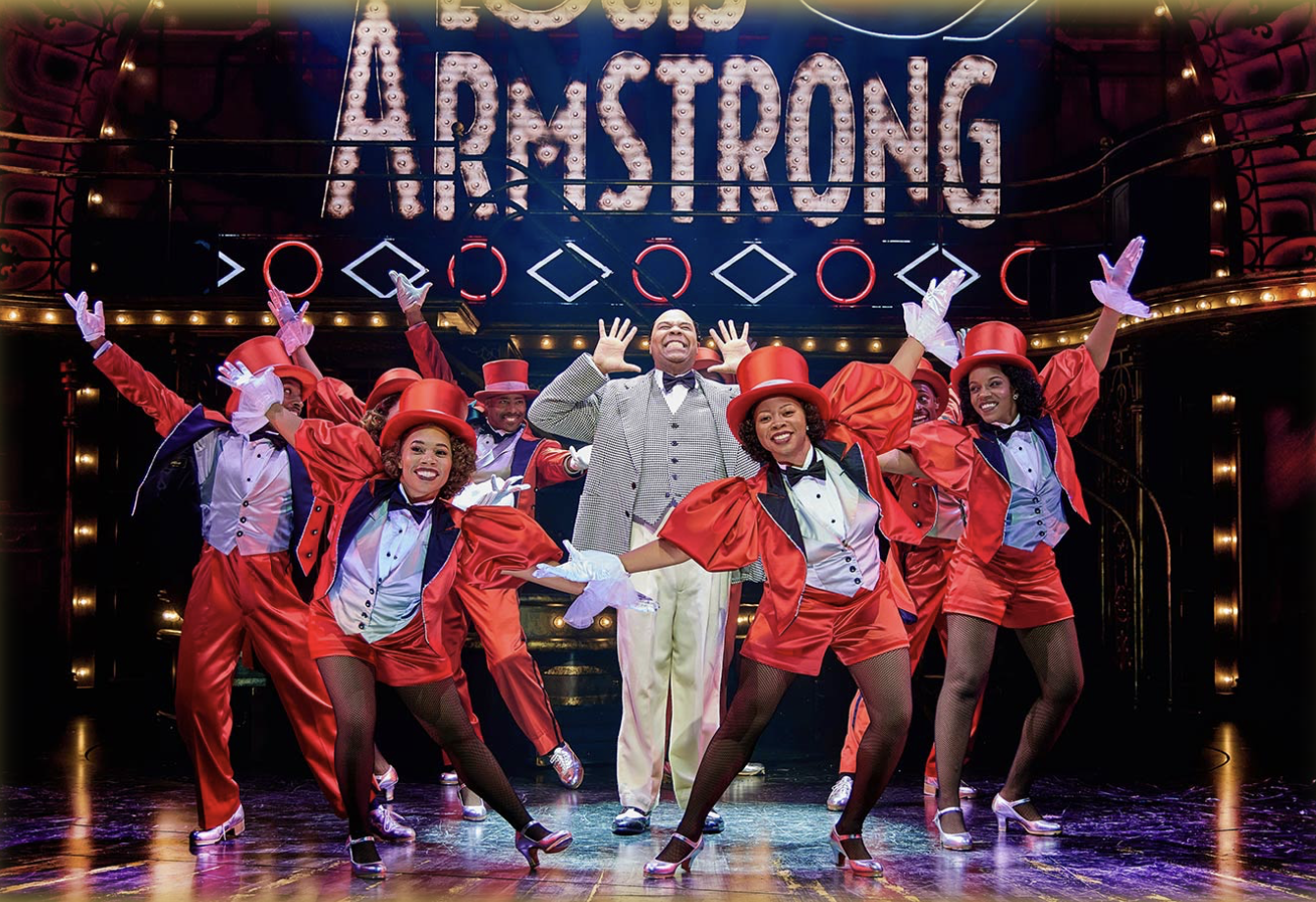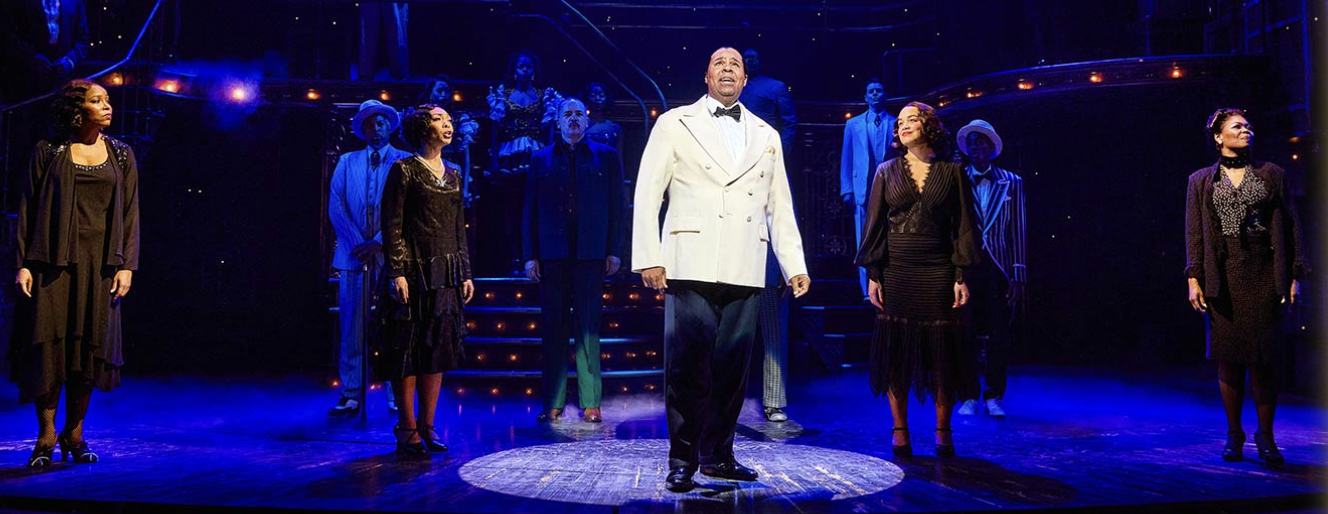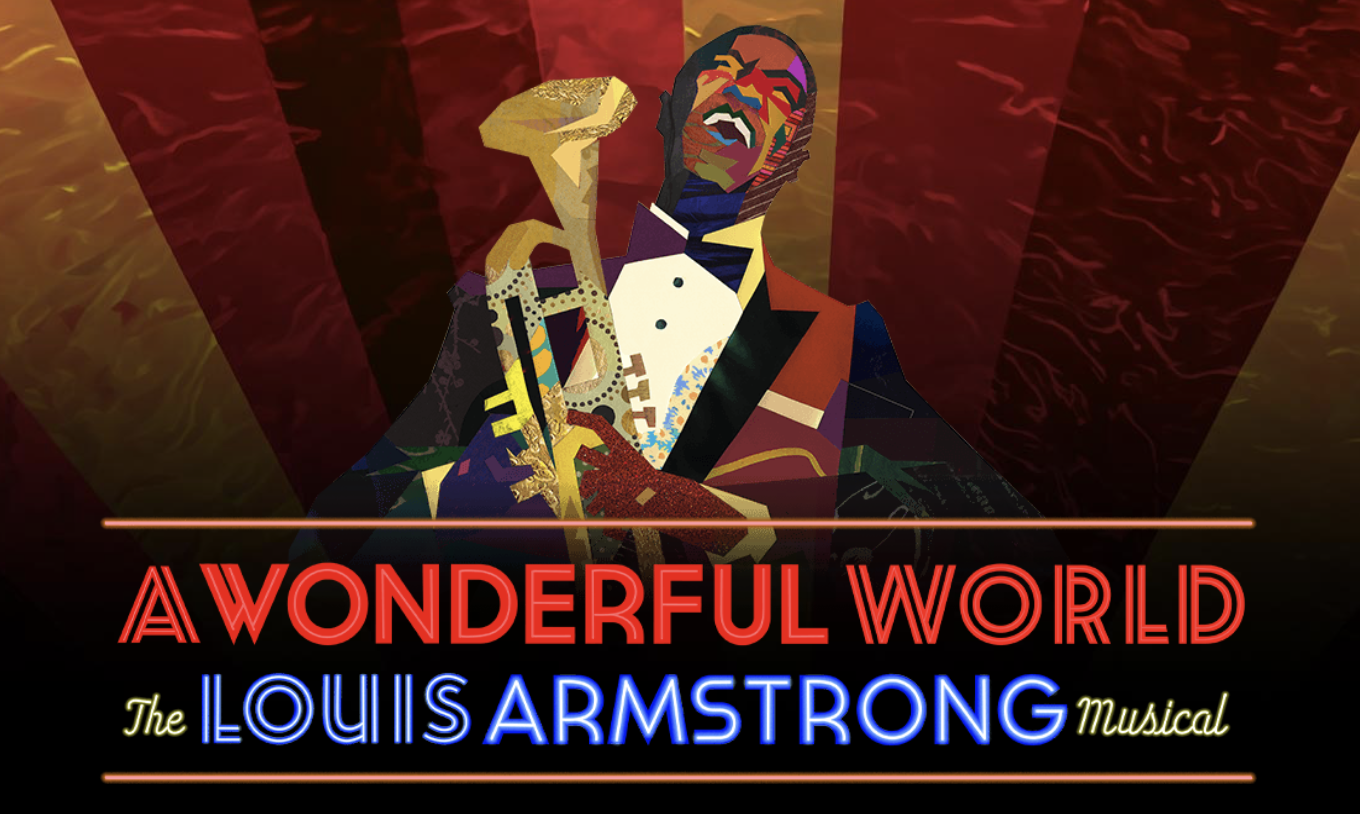Jazz Inspired Rags to Riches Story – With a Jewish Connection
By Two Sues on the Aisle, Susie Rosenbluth and Sue Weston
A Wonderful World Louis Armstrong: The Musical is a big production about the gravelly-voiced, and horn-playing jazz musician Louis Armstrong. The show is a tribute to an amazing man whose career and life were turbulent. Despite everything, he remained positive, focusing on working hard and spreading happiness and goodwill – to make the world a better place. A Wonderful World traces Armstrong’s life dividing it into four chapters, one for each of his wives and aligned with the places he lived. Each segment is chock full of songs and dance, a story of resilience, and hope.
Conceived by Andrew Delaplaine and Christopher Renshaw, A Wonderful World presents Armstrong’s life in a historical context showing the difficulties he experienced being black in the 1900s. Armstrong was born in 1901 in “the Battlefield” a poor district of New Orleans where children hustled to earn pennies to help their families.
Chronicling His Life
Armstrong was always on the move. He packed up and left a job performing on a Mississippi River riverboat after witnessing a lynching. He went to Chicago but faced pressure from the mob and moved to Hollywood. In Hollywood, he met veteran actor Lincoln Perry (DeWitt Fleming Jr.), whose career was based on playing the lazy, shuffling stereotype Stepin Fetchit. They discuss their public stereotypes while performing an amazing duet and tap number “When You’re Smiling.”
Finally, he moved to New York where, with the support of an agent, he became an ambassador for the United States. In 1957 he denounced President Eisenhower for his inaction when students were prevented from entering a segregated school in Little Rock, Arkansas, singing a mockery of “The Star-Spangled Banner.” Armstrong became a person non-grata, unable to get another position until Hello Dolly became a hit in 1963.
The Women in His Life
For Armstrong “Music and love work together like a couple,” He was married four times which were used to sequence the play. In New Orleans (1910s), he married Daisy (Dionne Figgins), a woman of the evening who became his muse. When he moved to Chicago (1920s) to play with King Joe Oliver (Gavin Gregory) he fell for jazz pianist, Lil (Jennie Harney-Fleming) who became his agent and dubbed him the King of Jazz. In Los Angeles (1930s), he married Alpha (Kim Exum) who enjoyed his money. Finally, in New York City he married Lucille (in the performance we attended this role was played by Trista Dollison), a strong-willed Cotton Club performer.
Armstrong moved forward, honing his skills on an ever-expanding stage. Louis reinvented music, growing up with the blues, changing jazz, and excelling at swing.
He challenged the world to see past color and believed it was a wonderful world.
Jewish Influence
Armstrong understood the similarities between the black and Jewish experience, as a child he worked for the Karnofskys a Jewish family living in a neighboring immigrant Lithuania community collecting junk and selling coal. In his memoir “Louis Armstrong + the Jewish Family in New Orleans, La, the Year of 1907,” Armstrong writes that Jews had suffered throughout history even more than Blacks. “I was only 7 years old, but I could easily see the ungodly treatment that the White Folks were handing the poor Jewish family whom I worked for.”
The Karnofskys called him “Cousin Louis,” he joined them for dinner, they introduced him to music giving him a tin horn, and later helping him purchase a cornet from a pawn shop. They instilled a work ethic, respect for others, and a love of family. Karnofskys were determined to succeed in the US, despite the antisemitism they faced, it was an improvement over the pogroms in Russia. They inspired Louis to sing from the heart.
Although the show devotes only a few lines to this Chapter in Armstrong’s life it was a fundamental element forming his character, and Louis wore a Star of David necklace most of his life.
A Grand Performance
A Wonderful World is a journey led by accomplished performer, James Monroe Iglehart, who adeptly captured Armstrong’s mannerisms, the gravel of his unmistakable voice, and vocal improvisations. Each and every performer delivered a memorable performance, contributing to a mesmerizing show. The varied tempo including the audience in several numbers delivered a fully inclusive experience.
Instead of ignoring his shortcomings, the show tastefully shares Armstrong’s tenacity, propelling himself forward as a performer, and tenderly exposes his weaknesses. Armstrong may be best remembered for the title track for the musical “Hello, Dolly!” which became a hit in 1963. “What a Wonderful World,” which he recorded in 1967, did not become a success until it was reissued in 1988 for the film Good Morning, Vietnam, earning him a posthumous Grammy.
Armstrong was a man, driven to overcome the adversity facing black performers. He performed for six decades, relying on his sunny personality. He was always running from trouble. But his hallmark of hard work, in combination with his unique style, sound, and electric smile, made him a legend.
His Special Charm
What makes Armstrong’s story so powerful is his charm, and willingness to spread love. His passion for music drove his career. He faced discrimination but did not let it turn him bitter. Armstrong grew up with the Civil Rights Movement, shaping the music industry, and creating a new sound. A Wonderful World encapsulates Armstrong’s vision –
I see friends shaking hands
Saying, “How do you do?”
They’re really saying
“I love you”
A Wonderful World tells Armstrong’s story in song and dance reminding us how far we have come to remove bias. He believed that despite the hatred, it is a wonderful world. Experience the magic of Broadway and extreme showmanship in a biographic that shows one man’s ability to overcome adversity and find love.
We enjoyed everything about the performance, including its venue in Studio 54, and left the theater humming happily the familiar tunes.
Two Sues on the Aisle bases its ratings on how many challahs (1-5) it pays to buy (rather than make) to see the play, show, film, book, or exhibit being reviewed.
A Wonderful World Louis Armstrong: The Musical received 5 Challahs
Final performance on Sunday, February 23, 2025










